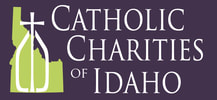Assistance for Afghans
|
This document provides information on pathways of migration and relocation to the U.S. for Afghans. The situation in Afghanistan is rapidly evolving and pathways are being impacted, therefore, this is meant as a guide and reference document only.
This is general information about legal processes. It is not meant as legal advice for individual applications. This information was revised in October 2021. Catholic Charities of Idaho is monitoring the situation in Afghanistan and would like to provide the following information: |
|
What immigration status is being assigned to afghans who are seeking protection?
HUMANITARIAN PAROLEMany Afghans are entering the United States with humanitarian parole, a temporary form of protection that offers employment authorization.
SPECIAL IMMIGRATION VISAS (SIV)Afghan arrivals also include individuals eligible for Special Immigrant Visas (SIVs) for aiding the U.S. mission (or with their SIVs in hand).
NEW REFUGEE ADMISSION CATEGORIESSome Afghans will come under new refugee admission categories as family members or employees of U.S. companies or non-profits. for afghan citizens residing in the U.S. who need legal help
You may be eligible to apply for asylum, Special Immigrant Visa (SIV) status, or another status. Please be advised that Catholic Charities of Idaho, at this time, cannot assist with these types of applications and we recommend that you consult with an immigration attorney. A list of private immigration attorneys in the United States is available here. For people currently in afghanistan
The U.S. led evacuation flights for Afghan nationals have ended. All visa appointments and interviews at the U.S. Embassy Kabul have been cancelled and the embassy is no longer operating. We do not know whether U.S. immigration processing will be available in Afghanistan in the future or if it is, when that might happen. Be careful about sharing your or your family’s information, if someone you do not know asks about your applications. Your options for legal status can be very confusing, especially when immigration procedures change quickly. Beware: Dishonest individuals know this and may try to trick you and steal your money. Some misuse the titles “immigration consultant” or “notario publico”. They will try to deceive you into believing that they are experts on immigration law and have the authority to give you legal advice about your immigration case when they do not. Many of these individuals lack sufficient training or knowledge of immigration law and their advice could create serious problems with your immigration case. They could even leave you in a worse position than where you started. Do not trust people who claim to have a special relationship with USCIS, or who guarantee certain results, or faster processing. Every case is unique and the length of time it takes to complete a process depends upon the details and circumstances of each case. Many arrivals will need access to legal representation to assist them in pursuing a permanent pathway to lawful status in the United States. |
|
Our Immigration Program offers legal immigration services to
born and foreign-born individuals in the United States and their family members overseas with matters before the Department of Homeland Security (DHS) and the Department of State (DOS). Catholic Charities of Idaho is currently aiding with Family-Based Applications. |
Please contact our office at 208.345.6031 to schedule a consultation.
The purpose of the consultation is to evaluate your eligibility for immigration relief, answer your immigration legal questions, and/or provide legal guidance on the relevant matter.
The purpose of the consultation is to evaluate your eligibility for immigration relief, answer your immigration legal questions, and/or provide legal guidance on the relevant matter.
Make sure the legal worker you consult with is an attorney or Department of Justice Accredited Representative. Only these two categories of people are authorized to provide legal advice about immigration.
Even well-meaning people can give bad legal advice. Always get help from someone who is qualified to help you with your immigration matter.
Even well-meaning people can give bad legal advice. Always get help from someone who is qualified to help you with your immigration matter.


